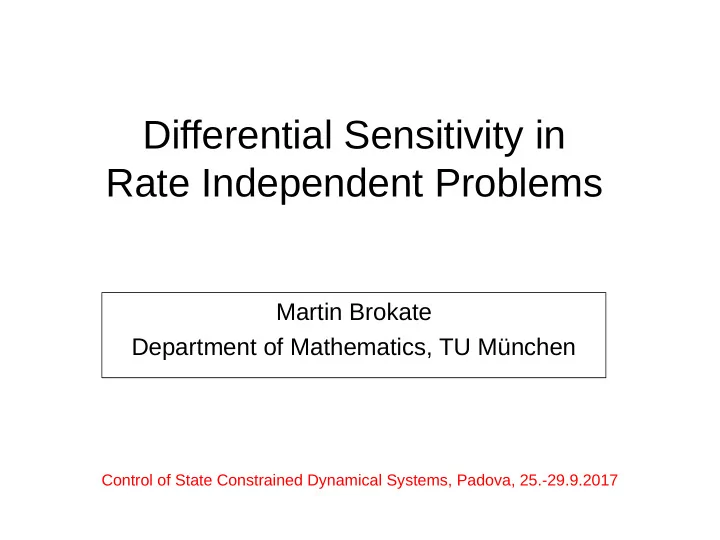

Differential Sensitivity in Rate Independent Problems Martin Brokate Department of Mathematics, TU München Control of State Constrained Dynamical Systems, Padova, 25.-29.9.2017
Parabolic control problem with hysteresis Minimize
Parabolic control problem with hysteresis Minimize not monotone
Rate Independence Input-output system Inputs Outputs
Play w r v
Play w r v if (interior) if (boundary)
Play w r v
Play w r v
Play: Derivatives ? w r v you expect:
Play: Derivatives ? w r v Moreover: Does exist ?
Play: Directional differentiability w w r v v (accumulated maximum) M. Brokate, P. Krejci, Weak differentiability of scalar hysteresis operators, Discrete Cont. Dyn. Syst. Ser. A 35 (2015), 2405-2421
Play: Local description Locally, the play can be represented as a finite composition of variants of the accumulated maximum. w o r v o
From maximum to play Maximum: Accumulated maximum: (gliding maximum) Play:
Maximum functional: Directional derivative convex, Lipschitz Directional derivative: Directional derivative is a Hadamard derivative:
Bouligand derivative is directionally differentiable Assume: The directional derivative is called a Bouligand derivative if Still nonlinear w.r.t the direction h. Better approximation property than the directional derivative: Limit process is uniform w.r.t. the direction h
Maximum functional: Bouligand derivative is not a Bouligand derivative is a Bouligand derivative
Newton derivative Semismooth Newton method:
Newton derivative (Set valued) Semismooth Newton method:
Maximum functional: Newton derivative Directional derivative:
Maximum functional: Newton derivative is not a Newton derivative is a Newton derivative
Proof
Upper semicontinuity
Upper semicontinuity
From maximum to play Maximum: Accumulated maximum: (gliding maximum) Play:
Accumulated maximum Directional derivative exists ``pointwise in time‘‘: Denote
Accumulated maximum The pointwise derivative is a regulated function, but discontinuous in general. Thus, is not directionally differentiable But is directionally differentiable.
Accumulated maximum: Newton derivative weakly measurable, is a Newton derivative
Accumulated maximum: Usc which is upper semicontinuous.
Accumulated maximum: Usc which is upper semicontinuous.
Play: Newton derivative Theorem . The play operator is Newton differentiable. The proof uses the chain rule for Newton derivatives, and yields a recursive formula based on the successive accumulated maxima. M. Brokate, Newton and Bouligand derivatives of the scalar play and stop operator, arXiv:1607.07344, 2016
Play: Newton derivative Newton derivative Newton derivative is globally bounded (in particular, the bound does not depend on the local description of the play in , nor on r)
Play: Newton derivative Can be improved to
Play: Bouligand derivative Theorem . The play operator is Bouligand differentiable. A refined remainder estimate holds as in the Newton case.
Parabolic problem Solution operator M. Brokate, K. Fellner, M. Lang-Batsching, Weak differentiability of the control-to-state mapping in a parabolic control problem with hysteresis, Preprint IGDK 1754
Parabolic problem Solution operator Assumptions: Then
Parabolic problem Theorem: (Visintin, Hilpert) Solution operator
First order problem Theorem: (variant of Visintin)
Auxiliary estimates Assume Then
First order problem Theorem:
Sensitivity result Theorem: The control-to-state mapping has a Bouligand derivative when considered as a mapping Proof: Estimates for the remainder problem
Sensitivity result Theorem: The control-to-state mapping has a Bouligand derivative when considered as a mapping An analogous result holds for the Newton derivative, for the special case of the accumulated maximum.
Parabolic control problem with hysteresis Minimize
Optimality condition Reduced cost functional
Recommend
More recommend